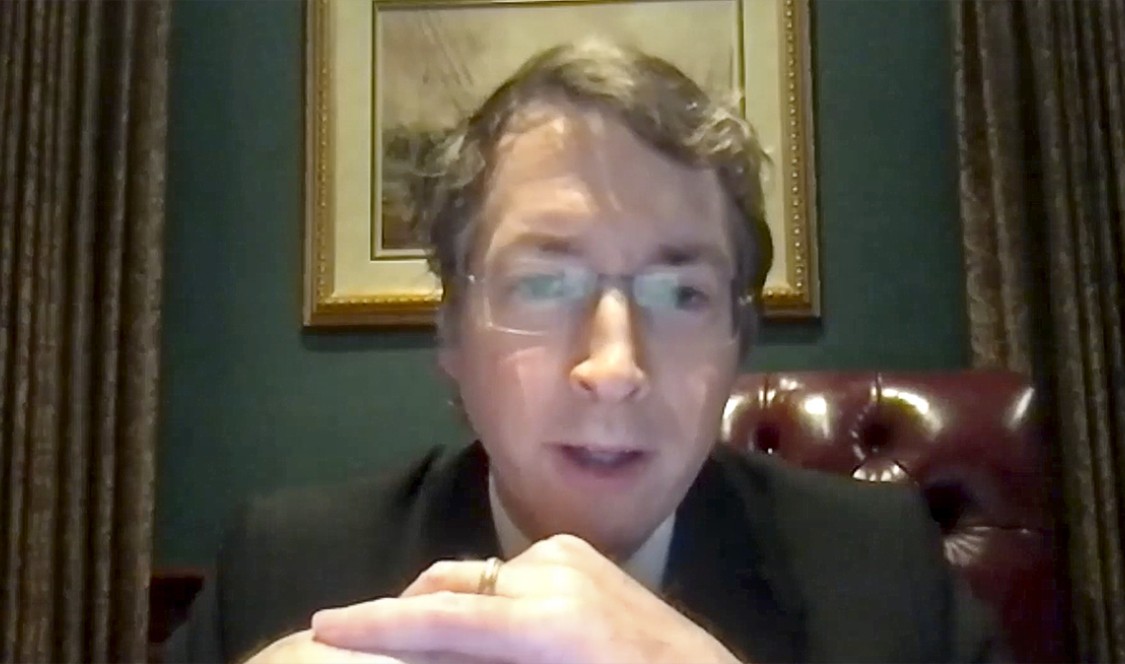Americans must find a way to respect one another, commit to engaging in civil disagreement, and become more astute consumers of news in order to get beyond our current divisions, according to Richard Lowry, editor of National Review and a conservative pundit.
Appearing at the virtual Athenaeum on Feb. 23 to discuss “The GOP After Trump: What's Next for American Politics,” Lowry addressed the cross-currents within the Republican Party and how he views the post-election political landscape.
“The big takeaway for those who are hoping for normalcy, because of the nature of the ongoing culture wars, is that it’s not going to happen—although the news cycles will be less intense with Trump not on Twitter nor in the White House,” Lowry said.
“Republicans represent half of the country, and are on the cusp of the majority in the House. This isn’t a party that’s going to blink out of existence anytime soon.”
Lowry noted that both the Democratic and Republican parties are “robust, deeply embedded civic institutions in this country,” despite how they have evolved over the years. “Since its inception, the Republican party has been a fusion between classical liberalism and a more populist, elemental conservatism,” he said. “What’s different about Trump’s appeal is that he represents the ascendance of populism. He reoriented the culture war battle lines away from issues of religious and social morality onto nationalism and political correctness.”
“Republicans represent half of the country, and are on the cusp of the majority in the House. This isn’t a party that’s going to blink out of existence anytime soon.”
Lowry noted that both the Democratic and Republican parties are “robust, deeply embedded civic institutions in this country,” despite how they have evolved over the years. “Since its inception, the Republican party has been a fusion between classical liberalism and a more populist, elemental conservatism,” he said. “What’s different about Trump’s appeal is that he represents the ascendance of populism. He reoriented the culture war battle lines away from issues of religious and social morality onto nationalism and political correctness.”
Trump’s populist agenda, Lowry said, was to make the conflicts between Democrats and Republicans about battling “elites,” while boosting national sovereignty and patriotism. “Trump has changed the Republican party irrevocably,” he said.
As cultural divisions go deeper within this environment, we are also “less prone to compromise,” Lowry said. “Unity is not going to happen. Trump’s agenda isn’t conducive to it, and the media landscape isn’t capable, thankfully, of enforcing consensus the way it was prior to the rise of 24-hour cable news and social media.”
As Lowry is the author of The Case for Nationalism: How it Made Us Powerful, United and Free, many of the questions submitted by CMC students, moderated by Ath Fellows Will Frankel ’21, Nandini Patel ’21, and Chris Agard ’21 focused on his expertise.
To the question, “Was January 6 [the Capitol insurrection] an example of unhealthy nationalism?” Lowry responded: “Absolutely. It wasn’t nationalism at all. The DNA [of those who took part] goes back to domestic extremist groups, like the KKK. The Confederate flag they were waving is an anti-nationalist symbol.”
Asked for advice on navigating news and social media feeds that are populated with disinformation, Lowry said: “You can marinate in total schlock, but there are also ways to get good solid information. You just need to be a conscientious news consumer and avoid news sites that refused to acknowledge Biden as the president-elect, for example.”
Being informed and respectful of each other’s viewpoints—embedded principles of CMC’s Open Academy, for example—is essential to the health of American democracy, Lowry continued. “We need people who are engaged in this country, who are committed to becoming as informed as they can to learning about this country and our history.
“We have sincerely held beliefs, but we need to respect one another’s differences and engage with each other in a civil manner. I think it’s really important. To the extent that this night represents that, I really appreciate being here,” Lowry warmly concluded.
—Anne Bergman

